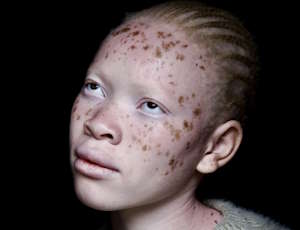
From 26 May, Sunday, the U Pęcherza Café will feature the Born Different exhibition as a side event to the 10th anniversary of the Jagiellonian Research Centre for African Studies and the 7th Congress of Polish Africanists. Open the article to read more about the exhibition.
The photographs presented at the exhibition visualise the everyday life of persons living in Africa and afflicted with albinism and are aimed at bringing attention to the realities of their lives in two African countries — Zambia and Benin. As outsiders, persons with albinism were formerly believed to be ghosts while contemporarily their body parts are believed to have magical properties, a notion which causes all kinds of danger and suffering. The central part of the exhibition focuses on the challenges faced by persons with albinism in Zambia. Their rights are violated on a daily basis and they experience multifaceted stigmatisation, social discrimination, isolation, and the omnipresent fear of a ritual killing.
The photographic exhibition presented in the Jagiellonian University Museum is a part of a broader research project organised by the Palacký University Olomouc and carried out the Czech cultural anthropologist Dr Kateřina Mildnerova and the photographer and photo journalist Antonio Cossa, a Mozambique native. Its conception aims at a creative combination of art and science, cultural anthropology and photography, and is based on team field research conducted in Zambia and Benin (2023–2024).
The Congress of Polish Africanists, organized by the Jagiellonian University on 23–25 May, is the biggest and most prestigious African research event in Poland, taking place every three years and hosting researchers representing various scientific disciplines, as well as persons involved in Africa on a professional level, including doctors, diplomats, or employees of numerous aid organisations.
The exhibition will remain open from 26 May to 29 September 2024, daily at 8:00–17:00, free admission.

